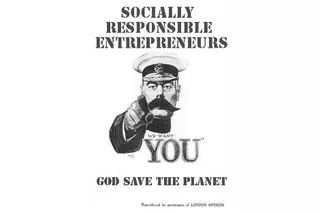
Corporate Social Responsibility: An Unnatural Relationship Between Profit & Social Purpose?
The unrivalled entrepreneurial spirit and philanthropic purpose of 19th century Great Britain was replaced by one of the great social innovations of the 20th Century, the creation of the welfare state, a blueprint of personal health and wellbeing. The moment also represented a shift in culture that saw the role of the individual social reformer transformed into becoming a bit player in State crafted products that promised much, invested heavily and did not always produce to expectations in real impact. As citizens we sanctioned successive governments to take sole responsibility for social welfare and in so doing, abdicated from our responsibility in the same. During this era of great social reform, business leaders and entrepreneurs retreated into the role of donors and passive supporters of government policy as opposed to leading and shaping that policy. In spite of a few, well known household names, there are not many exceptional entrepreneurs that readily come to mind that have been able to match the achievements of our Victorian predecessors.
If the 19th Century was the age of the great philanthropists and the 20th Century was the period of state welfare, could the 21st century be shaped by the enlightened self-interest entrepreneur committed to also making a real difference to the communities from which they profit?
Milton Friedman, the guru of trickle-down monetarist economics would not agree. It is his view that the natural instincts of the corporate leader will be to drive profits and then more profits, at any costs. It is his view, that corporate responsibility will always be incidental to core business objectives and that it could never be central to it. He goes further. He believes that an alliance between profit and social purpose is unnatural and end up being tokenistic, ineffective and unsustainable. Friedman’s position, some 35 years on is still wholly prevalent. Corporate social responsibility budgets for instance are in decline in real terms. Shareholder’s and institutional investors continue to apply relentless pressure to achieve optimum short-term returns to their investment. Within this climate, corporate responsibility is likely to be seen as an irrelevance to stressed-out senior executives working to tight margins in a financial environment where the single bottom line is king and a triple bottom line is an absurdity.
So, is the modern day version of the great 19th Century social reformer entrepreneurs truly a phenomenon consigned to history?
The aftermath of the financial crisis has irreparably damaged the reputation of corporate leadership for all the reasons so admired by Friedman. What was once seen as pre-requisite positive qualities is now seen as ruthless, morally deficient and ethically challenged behaviour. CSR has suffered greatly by association being seen as lacking in strategic intent, scatter-gun in application, un coordinated in delivery and ultimately devoid of ambition to achieve real scale of impact. CSR has become associated to buying brand association of feel good and good will on the cheap.
Does CSR deserve this reputation? There has, after all, been a lot of good work done through corporate social responsibility initiatives over the last 20 years. Interestingly, however, whilst corporate giving, in real terms, has gone down by over 50%, spending on cause related marketing - this is when core business objectives and social purpose investments is mutually beneficial - has increased considerably in real terms. So what is this saying? When evidence of impact is tangible business leaders will invest. We do not have a crisis of decency in the business world, to quote the Kevin Costner film, Field of Dreams, “build it and they will come.”
The message to government is clear. Business leaders are now less likely to support unaccountable NGO initiatives or the new government sponsored programme to fill in the gaps of statutory funding. If companies are giving less in real terms and the new philanthropist billionaires are prepared to give more, the message to future government policy is significant. The challenge is in how to engage the experience, expertise, the thought leadership and social investment within a sustainable and business-driven framework.
The new breed of individual, billionaire philanthropists is setting the trend. Their view of Government and NGO led social, welfare and environment programmes as wasteful and unaccountable has led to them forging new roles for themselves to personally manage their social investments. Warren Buffet’s $31billion added to the $29billion Bill and Melinda Gates Foundation, sets the new bench-mark in the arena of corporate engagement in social issues. In this instance, the motivation is wholly philanthropic, strategically targeted and driven to achieve a very clear set of social impact targets.
Melinda & Bill Gates speaking at the World Economic Forum in 2009
This is not a trend exclusive to your everyday billionaire. Comparably, there is a real sense of social purpose amongst young entrepreneurs wanting to combine their skills of making money with also making the world a better place to live.
So, will the 21st century become the age of the socially responsible entrepreneur? What evidence is there to suggest that these hybrid individuals could deliver profits with social purpose? And are there enough social entrepreneurs potentially ready and waiting to rise to the challenge? Even if they are, is government doing enough to incentivize current business leaders to cross the Friedman unnatural bridge? Has the relationship between policy and successful implementation created that all-important ingredient, an enterprise culture? I believe that the success of our leaders of the 21st Century will be measured by this one single challenge.
Beveridge & Friedman photos courtesy of Wikipedia. The Gates, Wiki Commons: Remy Steinegger
Kitchener Army Poster courtesy of Wikipedia. Altered by Jason Smith
Have an enquiry?
Send us a message online and we'll respond within the hour during business hours. Alternatively, please call us our friendly team of experts on +44 (0) 20 7607 7070.
Related speakers
Related from around the site
| Agile Development by Byte9
